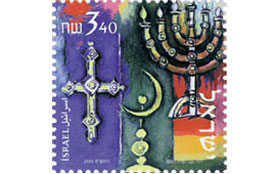PEOPLE: Religious Freedom
-
-
-
-

 Land of Three Religions
Land of Three Religions
|
Land of Three Religions (Courtesy of The Israel Philatelic Service)
GovXContentSection
|
|
|
Land of Three Religions (Courtesy of The Israel Philatelic Service) |
|
|
|
|
|
|
|
|
|
The Declaration of the Establishment of the State of Israel (1948) guarantees freedom of religion for all. Each religious community is free, by law and in practice, to exercise its faith, to observe its holidays and weekly day of rest, and to administer its internal affairs. Each has its own religious council and courts, recognized by law and with jurisdiction over all religious affairs and matters of personal status such as marriage and divorce. Each has its own unique places of worship, with traditional rituals and special architectural features developed over the centuries.
Synagogue: Traditional Jewish Orthodox worship requires a minyan (quorum of 10 adult males). Prayers take place three times daily. Men and women are usually seated separately, and heads are covered. Services may be led by a rabbi, cantor, or congregant. The rabbi is not a priest or an intermediary with God, but a teacher. The focal point in the synagogue is the Holy Ark, which faces the Temple Mount in Jerusalem and contains the Torah scrolls. A prescribed weekly portion is read cyclically throughout the year. Services are particularly festive on the Sabbath (Saturday, the Jewish day of rest) and holidays.
- Video: Faith in the Holy Land - Jews
Mosque: Muslim prayers take place five times daily. Men and women pray separately. Shoes are removed and a ritual ablution may be performed. Muslims pray facing Mecca in Saudi Arabia, the direction of which is indicated by a mihrab (niche) in the mosque wall. Services are performed by an imam, a Muslim prayer leader. On Friday, the traditional Muslim day of rest, a public sermon is usually preached.
- Video: Faith in the Holy Land - Muslims
Church: The form and frequency of Christian services vary according to denomination, but all observe Sunday as the day of rest, with special rituals. Services are conducted by a priest or minister. Men and women pray together. Services are often accompanied by music and choral singing. Traditionally, churches are cruciform in shape.
- Video: Faith in the Holy Land - Christians
|
|
|
|
|
Jerusalem: The Kotel (Western Wall) - Photo: I. Sztulman |
|
|
|
|
|
|
|
|
|
|
Jerusalem: The Dome of the Rock (Photo: Ministry of Tourism) |
|
|
|
|
|
|
|
|
|
|
Mount of Beatitudes: church exterior, traditional site of the Sermon on the Mount (Photo: Ministry of Tourism) |
|
|
|
|
|
|
|
|
|
|
Holy Places
Each site and shrine is administered by its own religious authority, and freedom of access and worship is ensured by law. Major holy places are:
Jewish: Jerusalem's Kotel (the Western Wall), last remnant of the retaining wall of the Temple Mount from the Second Temple period; Rachel's Tomb, near Bethlehem; Tomb of the Patriarchs in the Cave of Machpela, in Hebron; the tombs of Maimonides (Rambam) in Tiberias and Rabbi Shimon Bar Yohai in Meron.
Islamic: The Haram a-Sharif building complex on the Temple Mount, including the Dome of the Rock and Al-Aksa Mosque in Jerusalem; Tomb of the Patriarchs, in Hebron; El-Jazzar Mosque, in Akko.
Christian: Via Dolorosa, Room of the Last Supper, Church of the Holy Sepulchre, and other sites of Jesus's passion and crucifixion in Jerusalem; Church of the Nativity, in Bethlehem; Church of the Annunciation, in Nazareth; Mount of Beatitudes, Tabgha, and Capernaum, near the Sea of Galilee (Lake Kinneret).
|
|
-
-
-
-
-
-
-
-
-
-
-
-
-
-
-
-
-
-
-